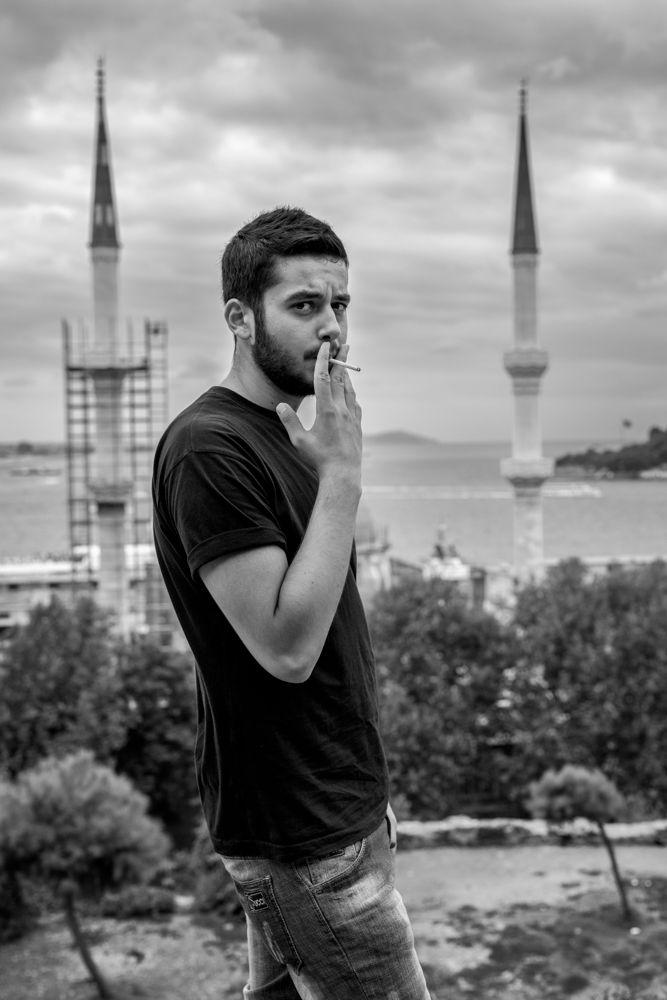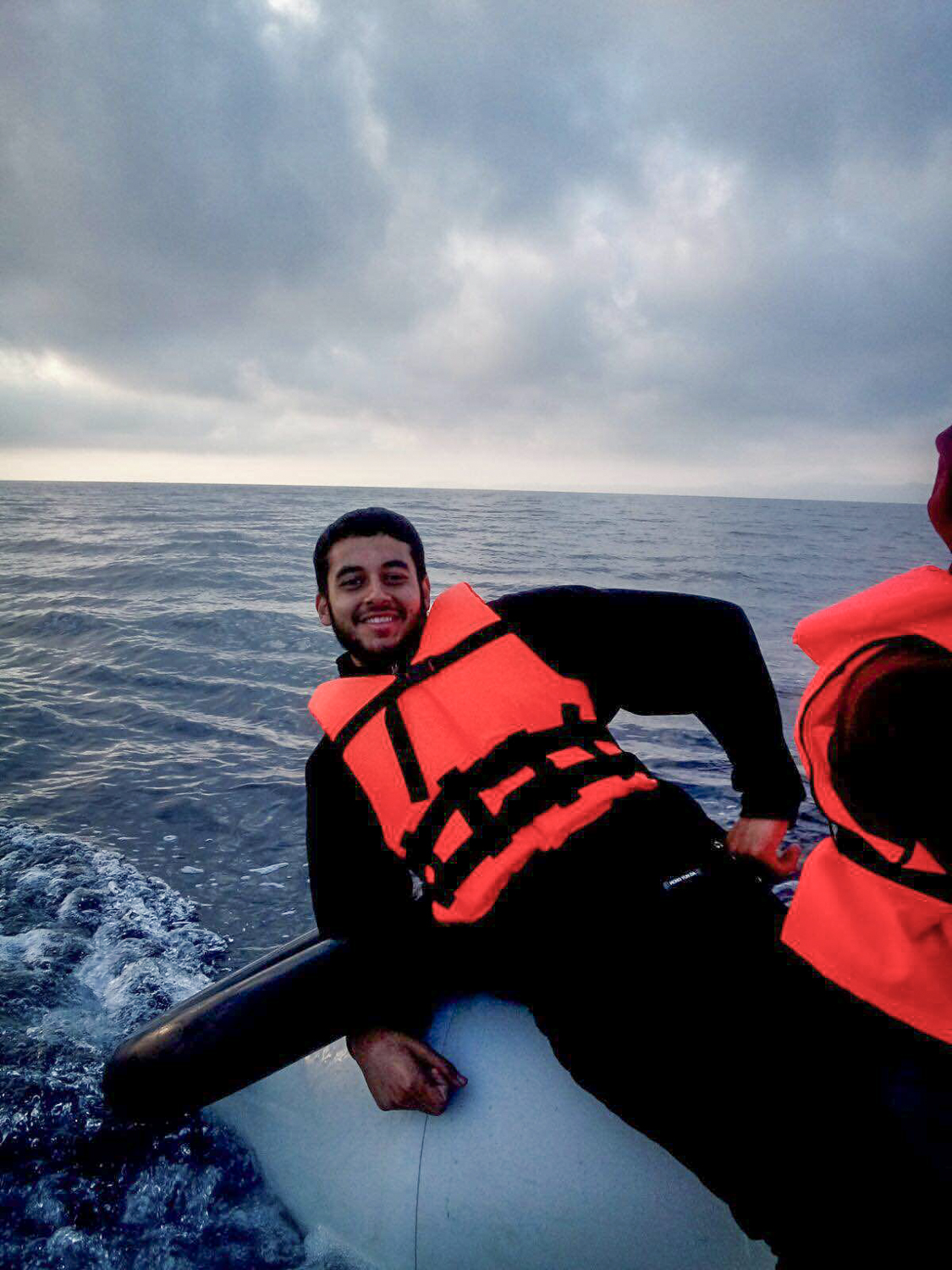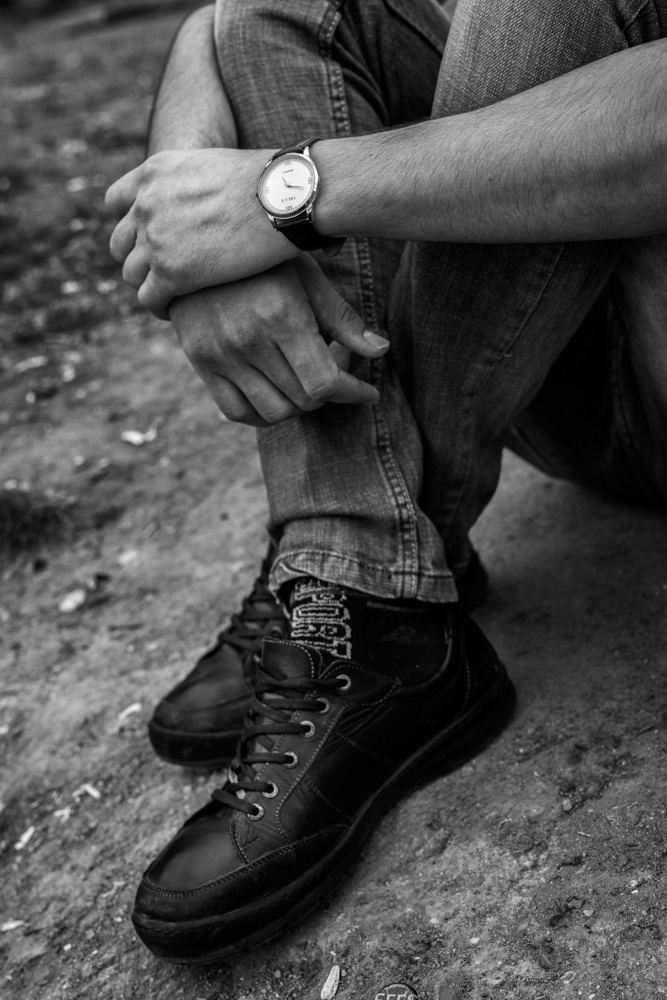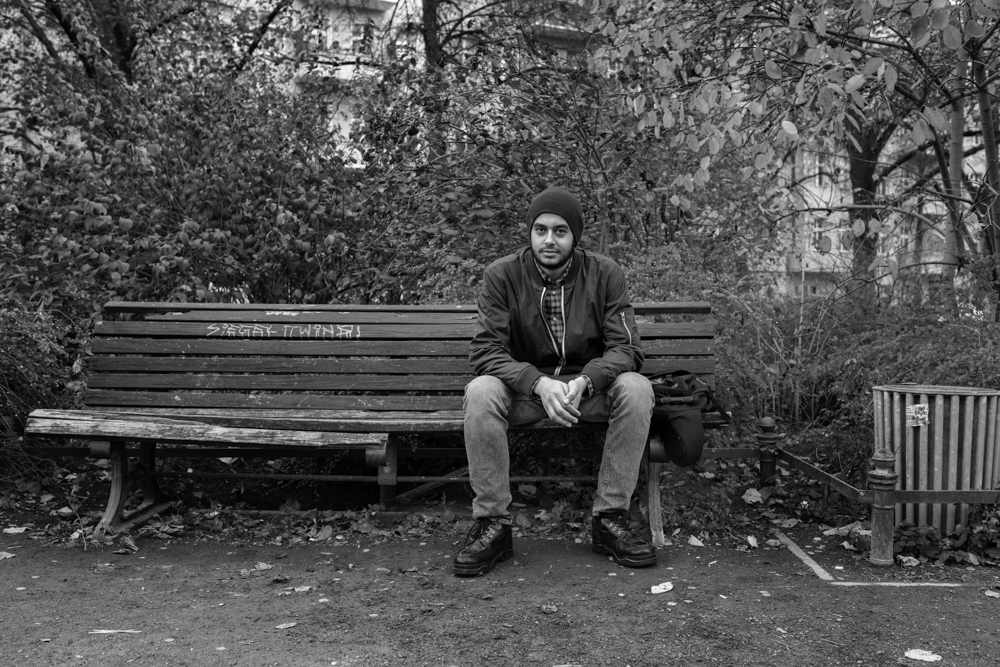Omar Jomaa
Age: 19 years old
Interviewed in: Istanbul, Turkey
Date: September 14, 2015

Omar Jomaa in a park in Chihangir, Istanbul overlooking the Golden Horn, a few week before departing to Europe. © Miguel Winograd
My name is Omar Jomaa, I am 19 right now. I am in Istanbul. I am going to Izmir soon to see my smuggler so he can smuggle me to the Greek islands and I can go to Germany. I was living in Damascus before I came here a month ago. My life before the war was going fine. My father is an engineer. He was his own boss. We had money coming in. For a long time before the war, my dream was always to study in a decent university outside Syria. My dad could afford that before the war; he could afford my trip, my visa, my studying in a decent university in a legal way, in Germany, in France or here in Turkey.
When the war began everything got worse where I was living in Old Damascus. The situation is very, very bad. The electricity comes and goes. It's on for four hours a day. Some days we don't have water for drinking or showering or anything. My dad's work is over. There is no more constructing things, only destroying.
So we studied our financial situation and I decided to come to Turkey to study here. My dream has always been to study Physics, quantum mechanics, Einstein, relativity and stuff like that. That couldn't happen in Syria, either before or after the war, because the universities are not specialized. If you study physics in Syria your only future would be being a teacher for high school students. There is no research or quantum mechanics professors who could teach you. I don't think there are even libraries for that.
So I came here to Turkey to Istanbul and started looking around. First of all, I went to banks to put my money in. I went to ten different banks and they wouldn't let me put my money in a bank, because they say I am Syrian. I don't know what that even means. I started to hate it here. You can't study here unless you have lots of money. That's what I don't have. So I looked into jobs and work for Syrians here. I found out that its miserable. You can't work and study in a college. There are no permanent half-time jobs. There are no jobs with shifts that are less than 12 hours here, especially for Syrians.
Then I decided that I would go. That I would travel to Germany illegally on the sea. I can't imagine myself being without university, without learning, without accomplishing what I want to do. Staying here just to work and earn barely enough to eat, I can't do that. I decided to go to Germany, so maybe in the future, after studying the language, I may be able to go to the university and the government could finance my studies because I'm a “refugee” or something. I hope this happens.

A photo of Omar crossing the Aegean sea to the Greek island of Lesbos in late September. ©Omar Jomaa
So there is a lot of risk in my journey to Germany. I hope I make it. There is a chance that I won't make it. I'm a little bit afraid, a little bit excited for the journey. It's a new world. I mean Istanbul is not different from Syria the way that Germany is different. It's going to be very different for me. The fact that I'm a refugee, I'm not traveling with a visa. I may never see my parents or my friends in Syria. So, yes, It's going to be dangerous. My journey is going to be messed up.
I'm following my dream and I'm going to study. I can't imagine myself not studying. I finished my high school in Syria and I could study in any university in Syria because I had good grades.
What is your worst nightmare?
My worse nightmare is that when I arrive in Germany, I wont be able to accomplish my goals. I'm afraid the university will not accept me because I'm a refugee or something. I don't know.
It's lots of nightmares, not just one. For Syrians, life is a nightmare after what happened. Syrians don't have any good place left or any good way to live anymore. The place where they lived can never be the same. We cannot go back. Our whole past lives were gone in a blink. Nothing can be done right now. But I think I should move forward. There is no way I can go backward in time. I'm going forward to Germany, and I hope it will be fine.
I am already used to being outside of Syria. Even when I was in Syria in the past four years I felt I was not even in my country any more. Because nothing in the past four years is as it was before the war. Everything has changed even, the people.
I was not even able to go to my village [Qalamoun mountains close to Damascus] and I couldn't stay out after hours. I was not able to leave a circle of five km inside the capital because it's dangerous. At some point I felt I was trapped inside my house. In the last days, most of the time we had no electricity or water. Even though the situation was really dramatic and desperate, we got used to feeling that Syria is not our country anymore.
Yes, I'm risking my life, but the risk I'm going to take on the boat is no way equal to the risk of me living anywhere in Syria. Living in Syria is terror itself. It's more risky than going to the open sea.
Yesterday when you were buying the life-vest how were you feeling?
I felt like it was the point of no return. The point you know you are going to do it. You are going to go out to sea. You may die. You may live. Who knows?
I was living in Damascus in the Old part of Damascus. It's in central Damascus. It's tough, always hard. You don't feel safe even inside your house, and nothing is certain [in terms of school and work]. Every time you wake up, you risk dying, and if you leave the house there is a possibility you will be detained or a mortar bomb will fall near you and you will be paralyzed or lose a limb. Anything can happen. I lost that feeling of uncertainty when I arrived in Istanbul. The only time I felt that again in Istanbul is when I was buying the life-vest.

©Miguel Winograd
Living in Syria is like living in a jungle. You know that if you survive your friend is not going to survive. In the end, someone will die inevitably. And its like this all over the country, it doesn't matter if you live in a government area or in a rebel area; anything can happen. Now Syria is the country of the militias, mortar bombs, and jails.
What are you going to take with you?
A backpack and a sleeping bag.
And from your house?
Pictures of my family and my hard drive. I'm also taking with me all the things I will never be able to erase from my memory: my friends who died, my relatives who died, and life after 2011.
What is the worst memory?
When my uncle died. If he died with a mortar bomb in the street we would be certain that he died, and we would mourn him for a period of time and then we would move on. But he was kidnapped from the street and we were waiting to hear from him for almost three years. And then we reached this point when we decided to just lose hope, which was really hard because we were not even certain that he died.
What are you going to remember about your uncle?
He used to love me so much. And he had a great sense of humor. He was such a great guy. I think he is the person I have loved the most in my life.
Do you dream about him?
Yes I dream about him, but only sense his presence. I don't see his face. Every time I had a dream about him I look at his pictures in my cellphone.
What hurts me the most is that today in Syria there are more than 500,000 people who have died or disappeared, and for the rest of the world they are just numbers. For America, the UN, and Russia they don't treat these numbers as human beings that are getting killed. Even if it reached one million or two million, it will be ok with them as long as it's just in the Middle East. But if its only 50 people who get killed outside the Middle East it would be a huge deal. Usually in the media, they focus on the consequences of the war, for example the refugee crisis, but they don't concentrate on the actual reasons behind it. It's upsetting.
What do you want your parents to know if you die while trying to cross to Greece?
No one is going to be sad, except my family because for the rest of the world I am going to be just another person who dies, just a number, and that's the only thing the world can do for me: count me as one more death. And to my parents I would say that I love them so much. And don't give up. We will meet again in paradise.

Omar arrived in Berlin in October, after a month-long stay at a refugee camp in Hamburg. ©Miguel Winograd